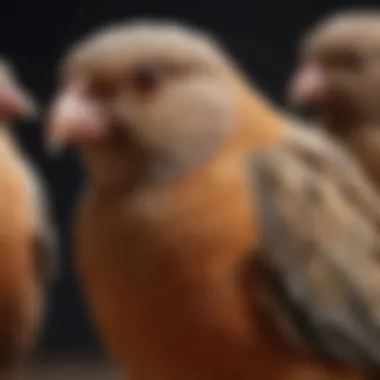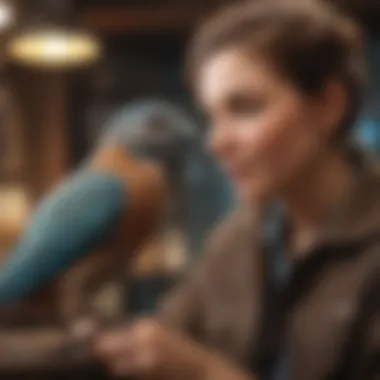Exploring the Market for Live Birds Online


Intro
The advent of the digital age has transformed many sectors, and the market for live birds is no exception. As aspiring bird owners explore their options online, understanding the intricacies of purchasing and caring for pet birds can significantly impact their experience. This article will provide valuable insights into the nuances of buying birds online and the responsibilities that come with it, ensuring that both buyers and sellers are well-informed about ethical considerations and species-specific needs.
The journey into the world of live birds is more than a mere transaction; it encompasses an understanding of avian care, emotional well-being, health, and safety. Furthermore, the roles of connectivity and socialization stand critical in nurturing these intelligent creatures. Moving beyond simply purchasing a bird, potential owners must also acknowledge their long-term commitment to avian welfare, requiring careful planning and consideration.
In the following sections, we will delve into essential aspects of avian care, emotional well-being, and safety practices. A central focus will be on the integration of ethics and proper needs for various species while engaging our keen audience interested in fostering a deeper relationship with their feathered companions.
Intro to Online Bird Sales
The online marketplace for bird sales is becoming more significant. As the world embraces technology, buying live birds through the internet offers both convenience and access to a wide range of species. This section outlines why understanding online bird sales is crucial for potential buyers, bird breeders, and enthusiasts.
Benefits of Online Bird Sales
Online sales provide a unique opportunity to connect with sellers beyond local markets. Buyers can explore a variety of birds, some of which might be unavailable in nearby pet shops. This broadens the choices significantly. Additionally, online platforms often feature detailed descriptions, care requirements, and prices, assisting in making informed decisions.
Considerations about Online Bird Sales
However, purchasing birds online requires careful thought. Prospective owners must consider the credibility of the seller, the ethical implications of bird sourcing, and the potential for misrepresentation of the animals. Thorough research is essential. Buyers should also ensure that they can meet the needs of the bird once it arrives home.
Through this section, we aim to provide a foundation on which readers can understand how online bird sales operate and the importance of critical evaluation in this expanding market.
The Evolution of Bird Sales
The journey of bird sales has transformed remarkably over the last few decades. Traditional methods involved local pet shops, breeding farms, or bird fairs. The rise of the internet has changed this landscape. Today, buyers can access global marketplaces with just a few clicks.
The early days of online sales were simpler, often listing limited species with minimal information. Now, detailed profiles, videos, and customer reviews are commonplace. Sellers use social media platforms, such as Facebook, to showcase their birds. This combination of technology and community engagement marks a significant shift in how birds are bought and sold.
Understanding the Online Marketplace
Navigating the online marketplace requires knowledge. Potential buyers must learn how to filter information effectively. The online bird market consists of various platforms, from dedicated bird-selling websites to general online marketplaces. Each has its own processes and seller standards.
Buyers should be cautious of the following aspects:
- Seller Reputation: Check seller ratings and reviews. A high rating generally indicates reliability.
- Transparency: A good seller provides detailed information about breeding, health, and care practices.
- Shipping Practices: Understanding how the seller ships their birds is crucial. Birds should be shipped safely to minimize stress.
By grasping these nuances, buyers can engage more confidently in the marketplace, knowing they are making responsible choices.
Types of Birds Available for Purchase
The online market for birds is vast and diverse. Understanding the types of birds available for purchase is crucial for potential buyers. Each type of bird offers unique traits and requirements, influencing the long-term commitment of ownership. Knowledge of these categories can help buyers make informed choices that align with their preferences and living situations.
Small Birds: Budgerigars and Canaries
Small birds, such as budgerigars and canaries, are popular among bird enthusiasts, particularly for those beginning their journey into bird ownership. Budgerigars, commonly known as budgies, are social and affectionate. They come in varied colors, which is visually appealing.
A budgie typically requires a relatively modest space, making it suitable for apartment dwellers. Canaries, on the other hand, are often admired for their beautiful singing abilities and vibrant colors. Both types thrive best when kept in pairs or small groups, supporting their social nature.
These small birds can be less demanding in terms of handling, yet they still need interaction and a stimulating environment. It is essential for potential owners to consider these needs before making a purchase.
Large Birds: Parrots and Cockatoos
Large birds, such as parrots and cockatoos, present a different set of characteristics and challenges. Parrots are known for their intelligence and capability to mimic sounds. Species like African Greys and Macaws require a high level of mental stimulation. They generally need larger spaces and more complex activities than smaller birds. Owners should be ready for a commitment of time and effort.
Cockatoos are renowned for their affectionate nature and playful behavior. However, they can also be loud and require extensive social interaction. Their social needs should not be underestimated. Those who choose to take in large birds must be prepared for the unique space, social, and emotional requirements they present.


Unique Species: Exotic Birds
Exotic birds, including species like the Eclectus Parrot and the Sun Conure, are often sought by experienced bird owners. These species exhibit a stunning array of colors and behaviors. Exotic birds can enrich the lives of their owners through their distinct personalities and intelligence. However, the responsibility involved is significant.
Owners should be aware that not all exotic birds are legal to purchase, as many are protected under wildlife regulations. It is crucial to research the specific requirements of each species and to ensure legal compliance in acquiring them.
In summary, understanding the different types of birds available is fundamental for anyone considering an online purchase. From small, manageable budgies and canaries to larger, more demanding parrots and cockatoos, to the unique and vibrant exotic species, each type requires careful thought and preparation to meet their needs effectively.
Ethical Considerations in Bird Sales
The market for live birds is not just a question of monetary transactions; it involves broader ethical considerations that impact wildlife conservation and animal welfare. Addressing these concerns is crucial for anyone engaging in bird sales, as it shapes how birds are sourced, cared for, and ultimately kept by consumers. The implications of ethical bird sales extend beyond individual purchases, affecting ecosystems and breeding practices.
In the realm of bird ownership, the importance of ethical considerations cannot be overstated. As potential owners or breeders, understanding these ethics will guide one’s decision-making processes, ensuring that actions taken resonate with values of compassion and sustainability.
Understanding Wildlife Regulations
Wildlife regulations are essential frameworks that govern the sale and trade of live birds. These laws are designed to protect species from exploitation and to ensure that their populations remain stable in the wild. In many countries, the capture and sale of wild birds are strictly regulated, sometimes requiring permits and licenses. It is vital for anyone involved in the online sale of birds to understand these regulations.
Here are some factors concerning wildlife regulations:
- CITES (Convention on International Trade in Endangered Species): CITES regulates trade in specific bird species that are threatened. Understanding which species fall under this treaty is crucial.
- Local Laws: Different states and countries may have their own regulations that could dictate the sale or ownership of certain bird species. Familiarizing oneself with these laws helps prevent legal complications.
- Impact on Conservation: Respecting wildlife regulations assists in maintaining biodiversity and conservation efforts. Every purchase can have a ripple effect on local bird populations.
"A responsible bird owner chooses to buy from sellers who adhere to wildlife regulations to support the sustainability of avian species."
Breeding Practices and Animal Welfare
Ethical breeding practices are vital when considering purchasing a live bird. These practices ensure that birds are bred in environments that prioritize their health and well-being. Ethical breeders aim to meet the physiological and psychological needs of their birds. They also comply with legal regulations regarding breeding operations.
Here are key aspects regarding breeding practices:
- Responsible Breeding: Responsible breeders conduct health screenings and assessments to prevent the transmission of genetic disorders in their birds. They should provide transparent information about the lineage and health of the birds.
- Socialization: Birds raised in socially enriching environments are less likely to develop behavioral issues. A good breeder will prioritize the social interaction that helps in developing well-adjusted birds.
- Living Conditions: Understanding the conditions in which the birds are raised fosters awareness in purchasing decisions. Birds should have ample space, proper nutrition, and enrichment activities.
Investing time in researching and selecting ethical sources for birds reflects a commitment to animal welfare and responsible ownership. This not only benefits bird owners but also contributes positively to the avian community at large.
How to Choose a Reputable Online Seller
Choosing a reputable online seller is crucial when purchasing live birds. The safety and welfare of the birds highly depend on the integrity of the seller. The online marketplace offers numerous options, but not all sellers adhere to ethical practices and provide quality care. Selecting a reputable seller ensures that you are likely to receive a healthy bird, along with insights into its proper maintenance. Additionally, a credible seller may also provide valuable resources and guidance tailored for both novice and experienced bird owners.
When evaluating potential sellers, certain elements stand out that warrant careful consideration. Buyers should prioritize sellers who are transparent about their breeding practices and the origin of their birds. This not only reflects a commitment to ethical standards but also indicates a responsibility toward animal welfare. Additionally, credible sellers often offer a clear return policy, which provides added reassurance in case any issues arise following the purchase.
"Buying a live bird online demands due diligence; a little research can ensure both your satisfaction and the welfare of your future companion."
Evaluating Seller Credibility
To assess the credibility of an online seller, one can start by examining their online presence. A trustworthy seller frequently maintains an informative and professional website, outlining their policies and services. Look for details about their breeding practices, the type of birds they sell, and their commitment to animal welfare. Moreover, established sellers often have a history of good customer service, which can be deduced from their website content and external communications.
Engaging directly with the seller through email or chat can also be revealing. Pay attention to their responsiveness and the clarity of their answers. Good sellers are usually willing to answer questions thoroughly and promptly.
Reviews and Ratings: What to Look For
Reviews and ratings can provide valuable insights into the reliability of an online seller. Online platforms, such as social media and avian forums, can be rich sources of information. When searching for reviews, consider these factors:


- Overall Satisfaction: Look for aggregated ratings as they reflect the experiences of multiple customers. High ratings usually indicate higher trustworthiness.
- Specific Feedback: Read through detailed reviews that discuss aspects such as bird health, delivery practices, and customer service.
- Recency: Prefer recent reviews to understand the seller's current performance. Sellers can change over time, and staying updated is important.
- Engagement with Reviews: A seller that responds positively to feedback, both good and bad, shows commitment to customer satisfaction.
By taking these factors into account, potential buyers can navigate the complexities of online bird sales with confidence, ensuring their choices are informed and responsible.
The Purchasing Process
The purchasing process for live birds online is fundamental to ensuring a positive experience for buyers. This step-by-step journey is not just about finding a bird. It involves making informed decisions that affect the welfare of the bird and the satisfaction of the buyer. In an evolving online marketplace, understanding this process is crucial for anyone looking to integrate a avian companion into their life. It encompasses various aspects, from navigating listings to dealing with logistics of shipping.
Navigating Online Listings
When exploring online listings for birds, a well-structured search is essential. Many platforms offer a wide array of options. Each listing typically includes important details such as the species, age, health status, and seller information.
Buyers should pay attention to the clarity of the listing. Well-documented listings often lead to better experiences. Here are some key tips for effective navigation:
- Filter options: Use available filtering tools to specify the type of bird.
- Seller ratings: Look for listings from sellers with high ratings and positive reviews.
- Contact sellers: Don’t hesitate to message sellers for more information regarding the bird’s history or care needs.
Moreover, additional resources available in the marketplace can provide valuable insights into different bird species and their requirements. Utilizing these tools allows buyers to make better choices.
Understanding Pricing Structures
Pricing structures for birds can vary significantly. Factors that influence pricing include the species, age, and breeding quality of the bird. Understanding these elements can help potential buyers set realistic budgets.
Generally, pricing can be categorized into three different tiers:
- Common Species: Birds like budgerigars and canaries typically have lower price points.
- Intermediate Species: Parrots and cockatoos often fall into a middle pricing range.
- Exotic Birds: Unique or rare species can demand high prices due to their rarity and care requirements.
Buyers must also consider potential additional costs, such as veterinary visits, food, and habitat setup. An informed budgeting strategy is vital in preparing for the long-term commitment of bird ownership.
Shipping Considerations
Shipping live birds comes with its own set of challenges. Understanding the logistics involved is crucial to ensuring the safe arrival of the new pet. Each seller may have different shipping methods or policies. Therefore, buyers should prioritize sellers who exhibit transparency about their shipping processes.
Considerations for safe shipping include:
- Shipping times: Ensure that the shipping method provides timely delivery to avoid stressing the bird.
- Packaging standards: Investigate how the seller packages birds for transport. Proper ventilation and comfort are critical.
- Insurance options: Look for sellers who offer insurance for live animal shipments. This can be crucial if anything goes wrong during transit.
"Understanding the purchasing process is instrumental in fostering better outcomes for buyers and enhancing the welfare of birds."
Overall, grasping the purchasing process from navigating listings to shipping considerations is essential for those entering the online market for live birds. Through diligent research and consideration, aspiring bird owners can ensure a smoother and more ethical experience.
Post-Purchase Responsibilities
Once you’ve successfully acquired your bird, the focus shifts to post-purchase responsibilities. Owning a bird is a significant commitment, and understanding how to care for these creatures is crucial. This section outlines several key areas to consider, ensuring that you provide a nurturing environment that supports your bird's well-being.
Creating a Suitable Habitat
Creating a suitable habitat is essential for your bird's health and happiness. Every species has distinct needs, which you must consider when setting up their home. The size of the cage, for example, should match the type of bird you own. Small birds like canaries can thrive in smaller cages, while larger birds like parrots require significantly more space.
- Cage Dimensions: Ensure the cage is spacious enough for your bird to move freely. A general rule is that the cage should be at least twice the wingspan of the bird.
- Perches and Accessories: Provide perches of varying diameters to promote foot health and enrichment. Add toys to your bird’s environment to stimulate their minds and encourage play.
- Ventilation and Light: Keep the cage in a well-ventilated area with natural light, away from direct sunlight and drafts. Birds need a balanced environment to feel secure and thrive.
Nutrition and Health Care


Proper nutrition and health care are vital for your bird’s longevity. Birds require a varied diet, tailored to their specific species. Common food options include seeds, pellets, fruits, and vegetables.
- Species-Specific Diet: Research the particular dietary needs of your bird's species. For instance, cockatoos may need more fresh vegetables compared to budgerigars.
- Regular Vet Check-Ups: Schedule annual veterinary visits to monitor your bird's health. Regular check-ups can prevent potential health problems before they become serious.
- Hygiene: Keep the cage clean by regularly removing uneaten food and waste. Ensure water is changed daily to maintain freshness and cleanliness.
Emotional Bonding with Your Bird
Building an emotional bond with your bird enriches both your lives. Bonding takes time and effort, but the benefits are worthwhile. Birds are social creatures and thrive on interaction.
- Daily Interaction: Spend time out of the cage, allowing your bird to interact with you. Gentle talking and soft handling can help your bird become accustomed to human presence.
- Training Opportunities: Introduce basic training exercises. Simple commands or tricks not only provide mental stimulation but also strengthen the bond you share.
- Understanding Body Language: Learn to recognize your bird's body language. Understanding their needs and emotions is key to forming a deeper connection.
"Every moment spent with your bird is a chance to enhance your mutual appreciation and trust."
By addressing these post-purchase responsibilities, you ensure a fulfilling relationship with your bird, leading to a happy life for both of you.
Common Mistakes to Avoid
When buying live birds online, certain errors can lead to complications and affect the well-being of the bird. Recognizing common mistakes prior to making a purchase is crucial. This section highlights key pitfalls that potential bird owners should be aware of to ensure a reputable and successful buying experience.
Inadequate Research Before Purchase
Understanding the specific needs of a bird species is essential. Many first-time buyers focus primarily on the bird’s appearance or price, neglecting in-depth research. Each species has its own requirements for habitat, social needs, and diet. Not spending enough time on research may lead to making impulsive decisions.
Gathering information about the species' typical behaviors and habits can prevent future disappointments. For instance, African Grey parrots are known for their brilliance and social behaviors. They require ample mental stimulation and interaction. Failing to recognize these needs can result in behavior issues later on.
Ignoring Bird Welfare Needs
Focusing only on aesthetics can lead to a neglect of bird welfare. Many buyers may overlook the importance of ensuring that the bird’s basic needs are met. This includes providing adequate space for living, proper nutrition, and opportunities for physical activity.
Utilizing reputable sources can aid in understanding what a bird requires for its well-being. Ignoring these needs can lead to serious health problems. A stressed bird can exhibit signs like feather plucking or lethargy. A commitment to their welfare means being prepared for the ongoing effort in caring for a live bird.
Neglecting Socialization and Training
Socialization and training are critical aspects of bird ownership that should not be disregarded. Birds are highly social creatures and thrive on interactions with their owners and other birds. A common mistake is to assume that a bird will naturally acclimate to its new home without any guidance or interaction.
Starting training early using positive reinforcement ensures proper behavior in social settings. An inadequate approach to training can lead to unwanted behaviors. It is vital for a bird owner to recognize the importance of spending time with their new pet, facilitating a trusting relationship.
In summary, avoiding these common mistakes can lead to a much more rewarding experience for both the bird and its owner. With detailed research, an emphasis on welfare, and prioritization of training, owners can foster a happy and healthy environment for their avian companions.
The Future of Bird Purchases Online
The future of purchasing live birds online represents an evolving landscape influenced by technology, consumer behavior, and sustainability. This section intends to explore the upcoming trends, potential challenges, and the broader implications of online bird sales. Understanding these elements is crucial for stakeholders within the avian community, including pet bird owners, aspiring bird parents, and breeders. By examining future trends and challenges, we can better prepare for an increasingly digital and responsible marketplace.
Trends in Online Bird Sales
The market for live birds is experiencing several notable trends, reshaping how sellers and buyers interact. Some relevant trends include:
- Increased Transparency: Buyers demand more information about the source and treatment of birds. This need for transparency influences sellers to provide detailed breeding and health information.
- Focus on Sustainability: Sustainability awareness is growing. Many consumers favor breeders and sellers who adopt environmentally friendly practices.
- Integration of Technologies: The rise of augmented and virtual reality tools allows potential buyers to have a more immersive experience. These technologies give insight into the birds' environments.
- Community Engagement: Platforms like Reddit and Facebook groups facilitate user discussions about bird care and sales, allowing buyers to connect with sellers and gather reviews.
In this digital era, savvy consumers leverage data to make informed choices, enhancing their understanding of bird welfare and care.
Potential Challenges Ahead
Despite the positive developments, significant challenges persist in the online bird sales sector. Each player in the market must navigate these hurdles:
- Regulation Compliance: Understanding and adhering to varying wildlife regulations can be challenging. Breeders and sellers must familiarize themselves with laws impacting their operations to ensure compliance.
- Counterfeit Products and Sellers: The risk of encounters with fraudulent sellers is real. Buyers must remain vigilant to avoid scams, which can lead to emotional and financial distress.
- Biodiversity Concerns: The online trade may inadvertently support illegal wildlife trade. Stakeholders must ensure that their practices do not contribute to the decline of certain bird species.
- Changing Consumer Expectations: As awareness grows, customer expectations evolve. Buyers may increasingly seek ethical sourcing, more education, and robust return policies. Sellers must adapt to these shifting demands to maintain their credibility.
"Understanding future trends and challenges in the online bird market is essential for making informed purchasing decisions and fostering responsible practices."
The dynamics of the online bird market require ongoing attention from all involved. Staying informed on emerging trends while being aware of challenges can help ensure a sustainable future for avian purchases online.















